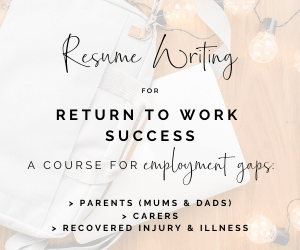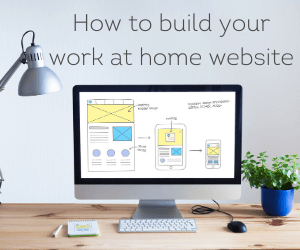Staying on task can be a challenge when you work from home. The children are fighting, your partner is nagging you, and the dog is making circles around the front door needing to be walked. So how do you deal with the constant interruptions when you work from home?
The easiest way to work productively working from home with kids is to have your own office where you can close the door and lock them out so you can concentrate on what you need to be doing. While that’s not always practical, other useful things are planning your day in advance, work in short blocks of time, determine your most productive time periods and knowing that sometimes you may need to take a break and focus on your family.
There are so many distractions when we work from home, from kids to housework, to procrastinating on social media. Keeping focused, whatever your work environment, can be a challenge. It can stop us from achieving a lot of focused work and mean that we just end up pushing paper around all day and not really getting much done! And then there are the distractions we create ourselves, to get out of that task that we’ve been avoiding and procrastinating about!
Working from Home Productively
If today is already shaping up to be another one of those days and you need a third arm, try not to stress. Working from home can be a handful, even for the well versed. Between ringing phones, dinging doorbells and kids underfoot, making a living from the comfort of your home is often anything but easy.
But although balancing home and work can sometimes be tricky, it is achievable. After all, that is why most people want to work from home in the first place. So here are some handy tips for being able to work from home in a productive manner, even with distractions and kids around.
Create a dedicated working space
Tapping on your keyboard in front of the television or at the kitchen table may work in the short term, but you will certainly accomplish more from a proper working space. Make your office a place you want to work.
Buy yourself a comfortable work chair for your office and make sure your desk is a space to get things done. You can also organise your office for maximum productivity. A beautiful desk of any size with a comfortable chair, corkboard of working notes and a whiteboard outlining your deadlines is definitely a more inspirational environment. You’ll be more productive if you comfortable and happy being at your desk.

Get Enough Sleep
Everyone has a different requirement for how much sleep they need, but the one thing we all have in common is that we do not function at our best unless we are getting that necessary amount. It is suggested that adults need between 7 -9 hours a night. Try to find your sweet spot as far as how much is best for you and make it a priority to get that sleep.
Get dressed
This may sound futile since there is nothing between you and your employer aside from a monitor but swapping those tracky dacks for real clothes will motivate you to get your day started.
You wouldn’t arrive at work in an office in the same clothing you wore to bed, so don’t do it at home, even though your workplace might just be steps from your bedroom. If I perform my work in my PJ’s, I’m less effective. It is better to get dressed so there is a psychological separation between working and simply staying at home relaxing.
Eat a breakfast with protein and fibre
It can be tempting to just head straight to your computer when you’re dressed and ready. However, it is important to start the day with a healthy breakfast first. Sitting down and eating a proper breakfast before you start work means you won’t feel hungry in 30 minutes and start looking for a snack. If your sugar level drops low, you’ll have a hard time concentrating. Eating a healthy diet will improve your productivity.
Keep plenty of water nearby. Staying hydrated helps your physical body and your mental concentration. Stay away from sugary drinks that send you soaring and then make you crash an hour later.
Plan your day in advance
What are your main tasks for the day? If you have set goals you are going to be more productive and disciplined to achieve them. If you’re just “winging it” you may find yourself floundering about from one task to another. Even plan your start and finish times, so there is a structure and time frames to get things done, just like working away from home.
Start with what is most valuable to your work. List everything you want to do that day and write a 1, 2, or 3 beside each tasks. The 1’s are the projects you must work on today. The 2’s are things you’d like to get started on if possible and the 3’s are things that could wait until tomorrow or next week. Don’t fall into the trap of being busy at low-value tasks.
Shut the door to your office
Put a “do not disturb” sign on the door with the time you’ll be done working. If you don’t have a separate room, explain to your family that the small corner of the dining room (or wherever) is your office and must be treated as such. Explain to your children not to bother you unless it is an emergency. When you’re working you can’t be bothered about small problems.
A good solution is to get some headphones – they don’t even have to be working. Explain that when your headphones are on your head you are unavailable, but if they are off, then you can be approached for things. This means that your family knows when you are doing something important and need some space.
If your kids are still young, hire a babysitter to come in for a few hours a day so you can have some uninterrupted time. A neighbour’s teenager may be perfect for this job. They won’t charge you a fortune and your kids will think it’s cool to have an older teen to hang out with for a few hours.
Close your browser window
Pick a certain time each day to read your emails and check Facebook for new cat videos. Otherwise, stay off. Don’t Facebook or Tweet or read the news when you’re supposed to be working. Things like social media can be compete time wasters when you should be getting other things done.
This can be a huge time sucker if you don’t learn to control your time there. When you must be on the internet, shut down everything except the page you need to be working on at that time. Limit your usage to your breaks, or after you’ve finished your work for the day. There are even apps you can get on your phone to limit or restrict your usage if you need help enforcing this.
Determine your most productive time periods
Some people work best during the early morning, others late morning or afternoon. A few are night owls who do their most creative work at 2:00 a.m. If you can, plan your schedule around your productive hours. Do the most important tasks of the day during that time.
Work in short blocks of time
Set a timer for thirty minutes to an hour and work on one project during that time. Then get up and walk around for five or ten minutes. Get a glass of water or some fruit. Then get back to work with another timer. It is very easy to constantly keep working when you are at home, especially if you are lucky enough to have no distractions. However, it is equally important to your brain and productivity levels to make sure you are having regular breaks and keeping hydrated.
Figure out what task you’re most avoiding
Then do that – right now. No procrastination, no excuses. Just do it and get it done. You can correct it or polish it later. Often avoidance of one task can keep an entire day from being productive.
Don’t expect perfection or you’ll freeze up and do nothing. Start right now and fix it later.

Focus
Perform only one task at a time and give your full attention to that task. When you absolutely can’t focus; get up and take a short walk. Let your mind clear and then return to your computer with new energy.
Stop Multi-Tasking. No matter how many people feel that multi-tasking is a positive and necessary trait, it is actually counter-productive to getting anything of value done. You may think you are making good use of your time by multi-tasking, but it actually makes it impossible to focus on anything fully and lessens the quality of your work.
Complete one thing well, before moving on to the next task. Trying to complete 5 different things at once means you aren’t concentrating on any of them properly.
Brainstorm
When you think of a brilliant idea while you’re working on something else, take a second and make a note in your idea document or your spiral. Then get back to work. The idea is safely saved for another time.
Take breaks
It’s imperative to practice a similar workday as though you were in an office. Since heading to the water cooler is not an option, take some time to play with the kids or walk the dog. Make sure you take a proper lunch break and when possible, enjoy your telecommunicating lifestyle by heading to a local coffee shop for a change of scenery.
Working from home can get lonely. When you work and live within the same four walls, you can readily get bored of your surroundings. Take a lunch break and try to dedicate one hour a day-to doing something different. The reversal of scenery will help you feel more creative.
Stay out of the kitchen
Make sure you’re taking your breaks at regular times, morning tea, lunch and afternoon tea, just like you would in an office. But stay out of the kitchen at other times. It may be tempting when working from home to just get up and grab a quick snack, but if you’re not careful, that could turn into a lot of quick snacks. I even find it helpful to pack some stuff for the day (fruit, snacks etc), just like you would working out of home.
Create boundaries
Whenever possible, prevent doing your washing and housework through the workday or replying to telephone calls that are private. Ask yourself in the event you were working in an office would you do this task?
It is very tempting to start doing housework when you should be working as you are home anyway. You need to create boundaries and remove house distractions. Don’t try to multitask business and household chores. You’ll end up doing a terrible job at both. The washing can wait until the weekend and get the kids to clean their own room. It will keep them busy while you are getting work done.
Make sure your partner is helping (if you have one). Just because you are working from home doesn’t mean you are working less, it just means you don’t have a commute. Make sure you and your partner are sharing responsibilities. Assign tasks to your children, especially if they are older. Let them help with the chores around the house. It will teach them responsibility and give you a tiny bit of extra time.
Prioritise
None of us has time for everything. As much as we try to get everything done, sometimes there simply are not enough hours in a day. Know what you need to do with work, your family and the household and figure out how it will all fit in.
Know when to stop
It’s not always possible to accomplish the goals we set each day however, unless you have a pressing deadline, try to end your workday at the same time throughout the week. By doing this you will create a routine and can look forward to knowing when your personal time begins.
Review
At the end of the day, review your list of tasks. Marking off your completed projects will make you feel good and inspire you to work harder the next day. Start your list for tomorrow’s projects.
Push through the hard times
Sometimes there’s nothing else to do but sit in your chair and make yourself do the work. Put words on the screen, complete a simple task, or start answering that mounting pile of emails. Working at home requires some willpower and motivation to do work when you may not always want to. That comfy couch and Netflix may look inviting but is not going to help you finish your tasks and will actually make life harder for you later.
Use schedules
Mothers who also work (at home or otherwise) are usually the ones landed with the longest ‘to do’ list. Those of us who work at home have found that having a balanced schedule is a sanity saver.
In your schedule, aim for four sorts of time, and try to block off the week so that everything gets more or less satisfied. The four are:
- Family time – focus on morning routines, mealtimes, bedtime and some weekend fun time together. Also don’t forget couple time with your partner and time for socialising with friends.
- Work time – work out when you absolutely must be working, and for how long, and fit other things around it.
- Household time – time spent on activities that you need to do to maintain the home, such as cleaning and cooking. We’re not talking House Beautiful here, but you won’t be popular if you forget to buy toilet paper (and it was scheduled as your job to do it).
- You time – this is important and overlooked. Even if it’s just half an hour a day, find space to do something for yourself; have a cup of coffee and watch a TV show, take a relaxing shower, go for a run, whatever helps you relax and recharge.
Having a roster of household jobs, with age-appropriate tasks for kids, can also help a great deal. This really saves a lot of stress and resentment. Sort out the jobs that you’ll do, which jobs your partner will do, and which jobs your kids will do on a weekly basis. With more sharing of tasks and a proper family schedule, you will begin to feel more on top of things and enjoy all the wonderful reasons to work from home.
Remember why you’re working from home
Was your original motivation more money? Freedom to work from anywhere? Choosing your own work schedule? Spending more time with your children? Or was is born out of necessity.
Whatever the reason, find a photo that represents your motivation. Place it above your computer and always remember why you do what you do.
Spend Some Time Alone
Don’t forget, it is extremely important to look after yourself too. Spend a few minutes alone each day. You like to read? You like to meditate? Good. Allocate a few minutes at the end of each day for yourself. Ask your family members to not disturb you during your ‘me time’. Pursuing your hobbies for a few minutes daily will revitalise you and will help you to be stress-free.
Since every work at home mum situation is different, try implementing as many of these elements as often as possible. And remember some days, despite your best efforts, everything will spiral into chaos anyway – and that’s OK. Do what you can do when you can do it.
How to keep the kids occupied when you work at home
For many women, the idea of working at home is a dream. They like the idea of being at home for their kids after school, or if someone gets sick. There’s no longer any concern when school holidays comes around. The kids have a place to be at home with you.
But there are some challenges to working at home with kids underfoot. Whether the children are younger or older, there can be challenges. Those challenges might be a little more manageable when the children are older, but there are still challenges, nonetheless.

Very young children
If you work at home and you have an infant or toddler, it’s unreasonable to assume that you can work full-time during the day and have the children at home as well. But all is not lost. Many mums find suitable solutions.
One option is to work then the kids sleep. If your child is having regular sleeps during the day, then work during those times. Some mums will work very early in the morning before their young child gets up and then late in the evening when the child has gone to bed. Of course, this might mean sacrificing some sleep yourself, but at least until the child or children are older, this can be a suitable arrangement. Buy hey what is sleep when you have young kids anyway!!
Another option is that you can hire help to come in and help you with the child or children while you’re working. If your infant generally sleeps the morning away, consider having someone come to help in the afternoon when he’s more alert. Since you will be at home and only need help for a short time, you won’t have to pay a babysitter as much as you would if you were gone all day.
Some mums who work at home with young ones will put the child in daycare. This might seem contrary to the notion of staying at home to be with your children, but there are times when there’s no other solution. Since you have control over your hours, you can drop your child off later than you would if you were commuting and you can also pick him or her up earlier. As your children get older, and enter preschool, this arrangement will no longer be necessary
Preschool children
If you have preschool-age children, your dreams for working at home become at once easier and more difficult. That is, at this age, children are more likely to play independently, but might also – rather vocally – demand your attention. This can be a challenge if you work on the phone.
Most mums find that the best arrangement for working at home with children this age is to work when the child is at preschool as well as in the early morning and late evening. Naptime is also ideal. Once your child gives up a nap, you can still institute a “quiet time” each day during which your child can read quietly, watch a movie, or do colouring or other artwork. This gives you a block of time to get some work done as well, but does work better for some children then others.
School age children
You might think that as soon as your children are in school, things will get easier. And they will, as you now have 6 hours a day to get work done. But if you want to work full-time, you must account for those extra few hours when the kids get home from school.
Many mums simply take the approach that involves setting up business hours and keeping the kids on a schedule that requires they respect those business hours. You can make clear to the kids that you aren’t available until your business hours are over (perhaps 5 p.m.).
One of the best solutions for most mums will involve keeping the kids busy. If you find many after-school activities for the kids you might have to drive them somewhere, but otherwise can work undisturbed in the afternoon hours. You might also arrange with other parents to trade off childcare duties. Or, if the kids are older and can play independently, you can offer to host play dates now and then. The kids will be busy and out of your hair and you can finish your day’s work.
Being at home with the children is one of the great motivators for mums who work at home, but it does take some planning and organizing.






